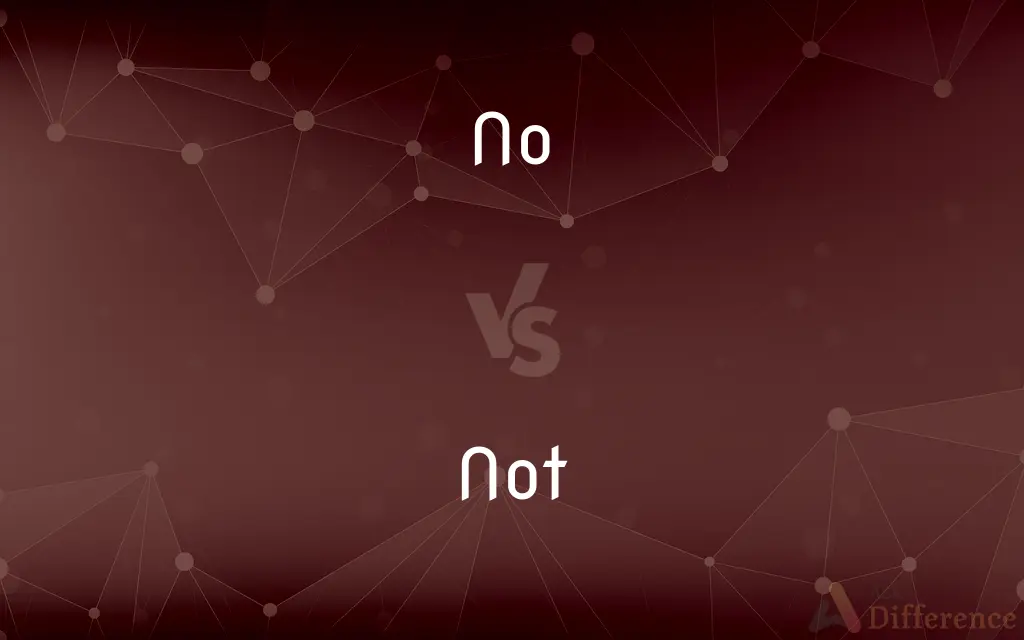No vs. Not — What's the Difference?
Edited by Tayyaba Rehman — By Fiza Rafique — Updated on November 2, 2023
'No' is a determiner or an adverb meaning the absence of an amount, or a denial, while 'not' is an adverb that negates a verb, adjective, or other adverb.

Difference Between No and Not
Table of Contents
ADVERTISEMENT
Key Differences
'No' serves as a determiner when it precedes a noun to indicate the non-existence of the noun in quantity or number. For example, "No cars are available." Conversely, 'not' functions as an adverb to negate a verb, adjective, or another adverb, such as in "She is not going." The role of 'not' is purely grammatical, serving to change the meaning of the verb by negating it.
When used as an adverb, 'no' signifies a negative response to a question or a refusal, such as in "No, I will not go to the party." On the other hand, 'not' cannot stand alone as a response; it must be part of a clause, as in "I will not attend the party." 'No' can be a complete sentence by itself, but 'not' cannot.
In some cases, 'no' can be used to describe a lack of a particular quality in a noun, as in "There is no sugar in the tea." In this function, 'no' is a determiner that negates the presence of the noun it modifies. 'Not', however, would negate the verb or the state of the noun, such as in "The tea is not sweet."
'No' often appears in expressions that set limits or boundaries, such as "no more" or "no less." It can also precede 'one', 'body', or 'thing' to make pronouns that indicate non-existence, such as "no one" or "nothing." 'Not' does not have this function; it is used to create negation in a sentence, commonly paired with auxiliary verbs like "do" or "be."
'No' can also function as an adjective when it qualifies a noun directly, suggesting a complete negation or absence, as in "No member objected." 'Not' can never be an adjective; it is purely an adverb used for negation in a sentence and is typically followed by a verb in its base form or by another adverb or adjective that it negates.
ADVERTISEMENT
Comparison Chart
Part of Speech
Determiner, adverb, or a noun (for 'no one').
Adverb exclusively.
Usage in Response
Can stand alone as a negative response.
Cannot stand alone; used within a clause.
Function with Nouns
Acts as a determiner to negate nouns.
Does not directly negate nouns.
Sentence Role
Can be used as the subject of a sentence.
Always modifies verbs, adjectives, or adverbs.
Common Combinations
'No more', 'no less', 'no one'.
'Not yet', 'not ever', 'not quite'.
Compare with Definitions
No
Used to make a negative response.
No, I haven't seen your keys.
Not
Indicates exclusion.
This is not my coat.
No
Not at all; not any possibility.
There is no way to finish on time.
Not
Used to reverse the meaning of a word.
She is not happy about the changes.
No
Used to describe prohibition.
No smoking in the building.
Not
Combined with every, as in 'not every', to mean not all.
Not every answer was correct.
No
Not any
There is no excuse
No two plants are alike
Not
Used to make a negative.
I am not interested in going.
No
Used to give a negative response
‘Is anything wrong?’ ‘No.’
Not
A logical operator that returns a false value if the operand is true and a true value if the operand is false.
No
Not at all; to no extent
They were no more able to perform the task than I was
Not
In no way; to no degree. Used to express negation, denial, refusal, or prohibition
I will not go. You may not have any.
No
Not
I'll no be a minute
Not
Negates the meaning of the modified verb.
‘Do they know?’ ‘I believe not’ (formal)
Did you take out the trash? No, I did not.
Not knowing any better, I went ahead.
No
Variant spelling of Noh
Not
To no degree.
That is not red; it's green.
It's not you, it's me.
No
Variant of Noh.
Not
Used to indicate the opposite or near opposite, often in a form of understatement.
That day was not the best day of my life. (meaning the day was bad or awful)
It was not my favorite movie of all time. (meaning the speaker dislikes or strongly dislikes the movie)
In the not too distant future my view on the matter might be not a million miles away from yours.
No
A negative response; a denial or refusal
The proposal produced only noes.
Not
And not.
I wanted a plate of shrimp, not a bucket of chicken.
He painted the car blue and black, not solid purple.
No
A negative vote or voter.
Not
(slang) Used to indicate that the previous phrase was meant sarcastically or ironically.
I really like hanging out with my little brother watching Barney
… not!
Sure, you’re perfect the way you are
… not!
No
Used to express refusal, denial, disbelief, emphasis, or disagreement
No, I'm not going. No, you're wrong.
Not
Wot not; know not; knows not.
No
Not at all; not by any degree. Often used with the comparative
No better.
No more.
Not
Shorn; shaven.
No
Not
Whether or no.
Not
A word used to express negation, prohibition, denial, or refusal.
Not one word spake he more than was need.
Thou shalt not steal.
Thine eyes are upon me, and I am not.
The question is, may I do it, or may I not do it?
No
(Informal) Used to indicate agreement with a preceding statement, especially when followed by a stronger judgment supporting that statement
"The car is getting old." "No, I know. It must be 10 years old by now.".
Not
Negation of a word or group of words;
He does not speak French
She is not going
They are not friends
Not many
Not much
Not at all
No
Used to express strong refusal, doubt, or disbelief.
Not
With 'only', as in 'not only... but also', to emphasize an addition.
Not only is he smart, but he's also kind.
No
Not any; not one; not a
No cookies are left.
No
Not at all; not close to being
He is no child.
No
Hardly any
Got there in no time flat. See Usage Note at nor1.
No
Not any.
No one
There is no water left.
No hot dogs were sold yesterday.
No phones were at the store.
No two people are the same..
There was no score at the end of the first period. (The score was 0-0.)
No
Hardly any.
We'll be finished in no time at all.
Fifty pounds for this is no money, really.
No
Not any possibility or allowance of (doing something).
No smoking
There's no stopping her once she gets going.
No
Not (a); not properly, not really; not fully.
My mother's no fool.
Working nine to five every day is no life.
No
(with following adjective) not, not at all
No
More and less, and idiomatically before other comparatives.}}
It is a less physical kind of torture, but no less gruesome.
You’re no better than a common thief.
Look no further than one's nose
This is no different from what we've been doing all along.
No
(informal) Used idiomatically before certain other adjectives.
This thing is no good.
The teacher’s decision was no fair.
No
Not
I just want to find out whether she's coming or no.
No
(archaic) nodot=a
No
Without
No
Like
No
Not, does not, do not, etc.
No
A negating expression; an answer that shows disagreement, denial, refusal, or disapproval
No
A vote not in favor, or opposing a proposition
The workers voted on whether to strike, and there were thirty "yeses" and two "nos".
No
Not any; not one; none; as, yes, we have no bananas; - often used as a quantifier.
Let there be no strife . . . between me and thee.
That goodness is no name, and happiness no dream.
No
Nay; not; not at all; not in any respect or degree; - a word expressing negation, denial, or refusal. Before or after another negative, no is emphatic.
We do no otherwise than we are willed.
I am perplx'd and doubtful whether or noI dare accept this your congratulation.
There is none righteous, no, not one.
No! Nay, Heaven forbid.
No
A refusal by use of the word no; a denial.
No
A negative vote; one who votes in the negative; as, to call for the ayes and noes; the noes have it.
No
A negative;
His no was loud and clear
No
A radioactive transuranic element synthesized by bombarding curium with carbon ions; 7 isotopes are known
No
Quantifier; used with either mass nouns or plural count nouns for indicating a complete or almost complete lack or zero quantity of;
We have no bananas
No eggs left and no money to buy any
Have you no decency?
Did it with no help
I'll get you there in no time
Have some milk
Some roses were still blooming
Having some friends over
Some apples
Some paper
No
Referring to the degree to which a certain quality is present;
He was no heavier than a child
No
Not in any degree or manner; not at all;
He is no better today
No
Used to express refusal or denial or disagreement etc or especially to emphasize a negative statement;
No, you are wrong
No
Not any; not a.
No sugar was added to the tea.
No
Expressing disagreement or contradiction.
No, you’re mistaken about that.
Common Curiosities
Is it correct to use 'no' before verbs?
No, 'no' is not used before verbs. 'Not' is used for negation in verbs.
Is 'not' ever used with nouns directly?
No, 'not' is used with verbs, adjectives, or adverbs, not directly with nouns.
Can 'no' be a noun?
Yes, in cases like 'no one', it acts as a pronoun indicating non-existence.
Is 'no' used in formal writing?
Yes, 'no' is appropriate in formal contexts.
Can 'no' be part of a compound noun?
Yes, as in 'no-go' or 'no-show'.
Can 'no' be used on its own?
Yes, 'no' can be a stand-alone response to a question.
How do I negate a sentence using 'not'?
Place 'not' before the main verb or after the auxiliary verb.
What is the difference in tone between 'no' and 'not'?
'No' can be more emphatic, while 'not' is more neutral.
Can 'no' and 'not' be used interchangeably?
No, they serve different grammatical functions and are not interchangeable.
Do 'no' and 'not' have positive forms?
Yes, their positive counterparts are 'yes' and 'do/does' respectively.
Is 'no' used in idiomatic expressions?
Yes, such as 'no pain, no gain'.
How does 'not' function with auxiliary verbs?
'Not' negates the meaning, as in "She has not finished her work."
Can 'not' be contracted?
Yes, it often is, as in "isn't" or "haven't".
Can 'no' and 'not' be used in questions?
Yes, but 'no' is typically used in tag questions, while 'not' is used in regular negative questions.
Does 'no' always require a noun after it?
No, it can stand alone or with phrases like 'no more'.
Share Your Discovery

Previous Comparison
Gear vs. Equipment
Next Comparison
Fix vs. WorkaroundAuthor Spotlight
Written by
Fiza RafiqueFiza Rafique is a skilled content writer at AskDifference.com, where she meticulously refines and enhances written pieces. Drawing from her vast editorial expertise, Fiza ensures clarity, accuracy, and precision in every article. Passionate about language, she continually seeks to elevate the quality of content for readers worldwide.
Edited by
Tayyaba RehmanTayyaba Rehman is a distinguished writer, currently serving as a primary contributor to askdifference.com. As a researcher in semantics and etymology, Tayyaba's passion for the complexity of languages and their distinctions has found a perfect home on the platform. Tayyaba delves into the intricacies of language, distinguishing between commonly confused words and phrases, thereby providing clarity for readers worldwide.
















































